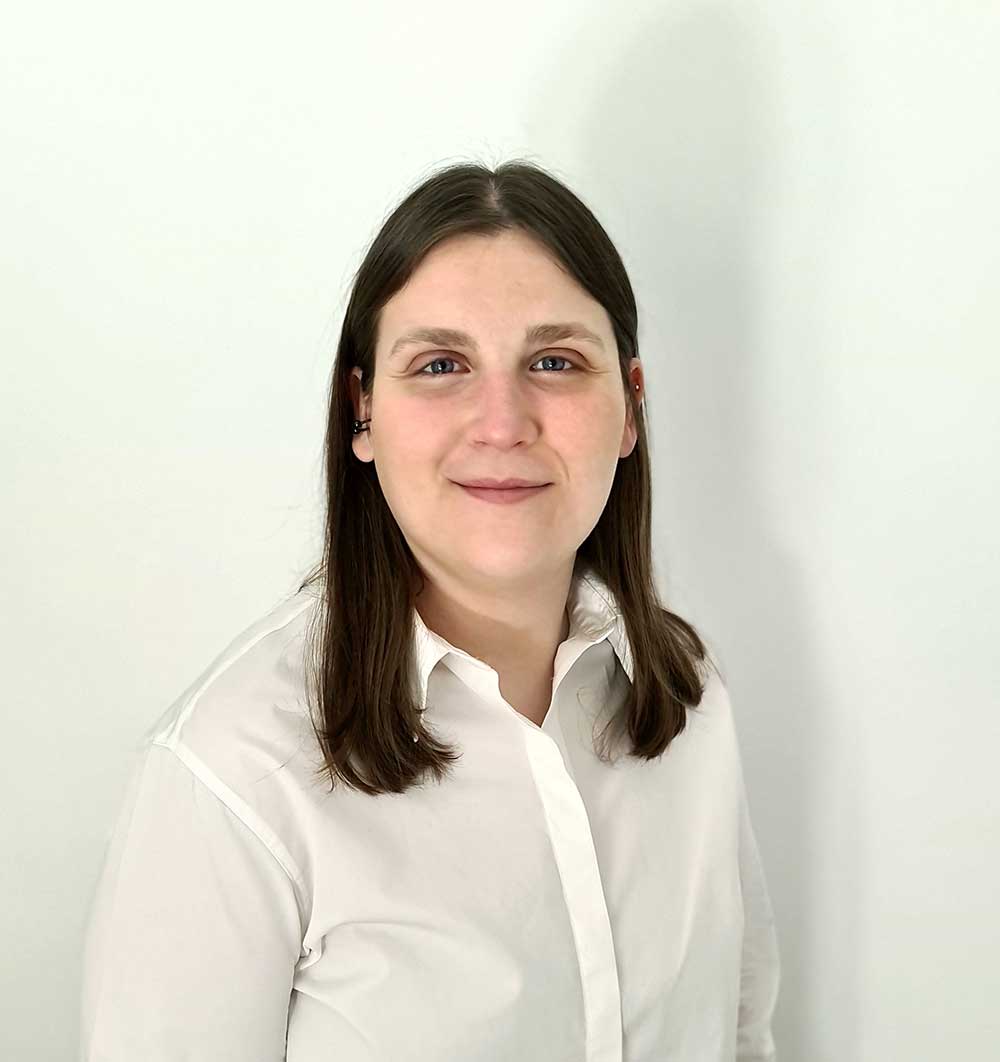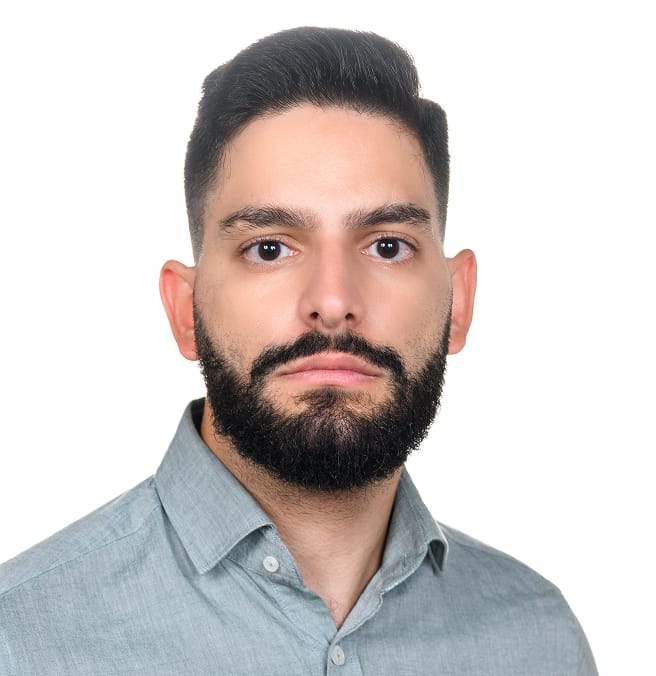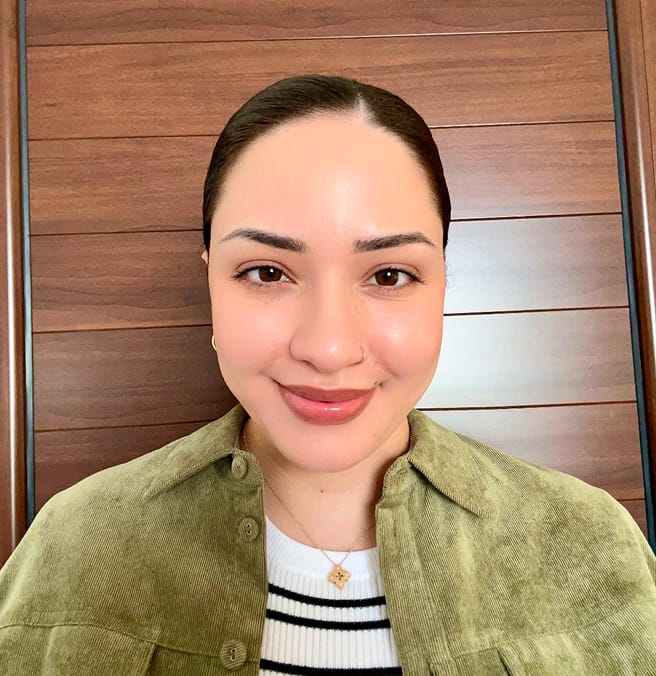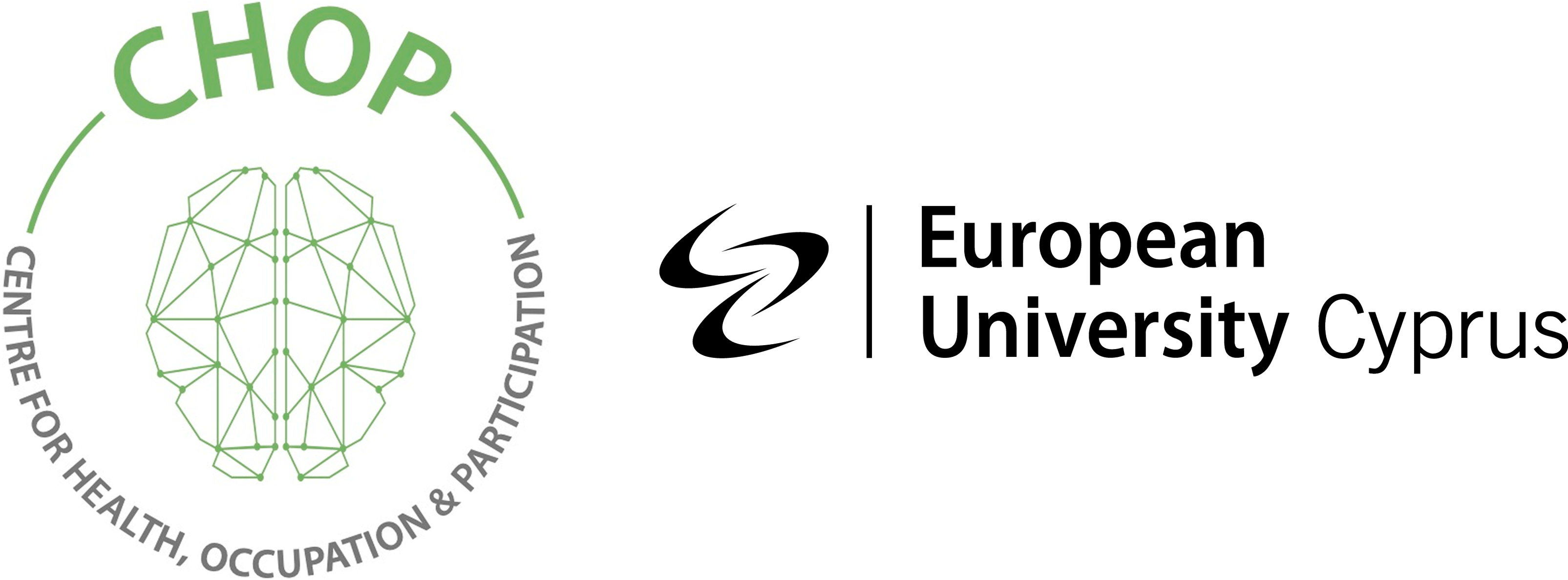Plasticity
Leader: Dr. Pavlina Psychouli
Clinical Educators: Charalambos Anastasiou & Antria Kyriakou
Supervisor: Nefeli Papasalourou
plasticityot@euc.ac.cy
Telerehabilitation
Nefeli Papasalourou — +35799753429
In-Person
Charalambos Anastasiou — +35799288624
Antria Kyriakou — +35797617175
About this Lab
The Plasticity Lab, part of the Center for Health, Occupation, and Participation (CHOP) at the European University of Cyprus, has been providing free occupational therapy services since October 2019. We offer both in-person and telehealth support for individuals of all ages with motor difficulties due to neurological and/ or orthopedic dysfunctions.
Our mission is to enhance quality of life and independence through individualized, evidence-based interventions that promote participation in daily activities and social life. We provide free, high-quality occupational therapy services while advancing student learning, clinical practice, and research in rehabilitation.
At the core of our approach is neuroplasticity—the brain’s ability to adapt and grow through experience. Our interventions are client-centered and engaging, designed to help individuals build the adaptive skills needed for success in daily life. Services may include motor learning training, fatigue and pain management, use of assistive devices, and environmental adaptations to support functional independence.
As a university-affiliated lab, we integrate the latest research and innovative therapy techniques to ensure the highest standard of care. Occupational therapy students gain hands-on experience by working directly with clients under the supervision of experienced faculty and licensed clinicians. We also welcome Erasmus+ internship students from partner universities across Europe, providing valuable opportunities for clinical training and research in a supportive learning environment.
Beyond clinical services, the lab is actively engaged in neurorehabilitation research and welcomes collaboration to advance innovative intervention methods. We are committed to improving both clinical practice and academic knowledge in the field of rehabilitation.
Through cutting-edge research, hands-on learning, and a strong commitment to accessibility, Plasticity empowers individuals of all ages—one step, one activity, and one breakthrough at a time.

Free Service

Group or Individual sessions

Online or In Person

Educating EUC Students
What to expect from Plasticity
Services
We offer free occupational therapy evaluation and intervention services, both in-person and via tele-rehabilitation, for adults and children primarily with movement disorders. Our goal is to implement therapeutic techniques supported by strong research evidence to ensure effectiveness. As part of our interventions, we may provide custom-made splints and offer intensive programs tailored to individual needs. Part of the intervention may include custom made splints construction and intensive intervention programs tailored to individual needs.
Education
The lab aims to equip OT students with in-depth, evidence-based knowledge in rehabilitation, ensuring they are fully prepared for professional practice. We are delighted to welcome students from other universities to complete part of their fieldwork placement with us.
Research
We strive to advance research on enhancing knowledge in motor learning, neuroplasticity, and the integration of interventions that accelerate motor rehabilitation following neurological damage. We welcome collaborations with universities, NGOs, and professional bodies worldwide on research projects
Facilities
The rehabilitation laboratories provide a well-equipped and versatile environment for the assessment and retraining of individuals with movement disorders. They feature a wide range of electronic systems, assistive technologies, and therapeutic tools that support both functional rehabilitation and upper limb recovery. In addition to advanced devices such as virtual reality and robotics, the space includes a dedicated area that physically simulates real-life settings to facilitate training and re-education in activities of daily living, enhancing both skill transfer and patient engagement. The laboratories also feature materials and equipment specifically designed for pediatric rehabilitation through play, as well as resources related to school-based activities.
Collaborations
The interventions used at the Plasticity Lab are often the result of the collaboration of an interdisciplinary team that in addition to the occupational therapists may include physiotherapists, speech therapists, special educators, biomechanists, computer engineers, etc.
The lab receives referrals directly from clients, as well as from doctors, educators, and other healthcare professionals.
The Plasticity Team

Dr. Pavlina Psychouli
Plasticity Leader
Dr. Pavlina Psychouli is an Associate Professor of Occupational Therapy and Neurorehabilitation and the Coordinator of the B.Sc. in Occupational Therapy and the M.Sc. in Neurorehabilitation programs at European University Cyprus (EUC). She earned her Ph.D. from the University of Southampton, UK, focusing on modified versions of Constraint-Induced Movement Therapy (CIMT) for children with cerebral palsy.
Her research interests lie in neuroplasticity, recovery following brain injury, and movement rehabilitation. With extensive clinical experience, she has worked primarily with pediatric populations and adults with neurological disorders.
Dr. Psychouli is also a certified CI therapist, having completed her training at the University of Alabama at Birmingham, USA.

Nefeli Papasalourou
Plasticity Supervisor
Ms. Nefeli Papasalourou is an occupational therapist and clinical supervisor in neurorehabilitation and telerehabilitation at the BSc Occupational Therapy Program at the European University of Cyprus (EUC). She has completed her undergraduate studies at the Technological Educational Institute of Athens, Greece, and qualified for the MSc Cognitive Neurorehabilitation at Cyprus University of Technology. She is a PhD candidate in the field of rehabilitation sciences at Cyprus University of Technology.
Her research interests are in the fields of neurorehabilitation, telerehabilitation, and recovery from neuronal damage. Ms. Papasalourou has been working as an occupational therapist for over ten years, and she has been mainly interested in fields related to neurological disorders such as cerebral palsy, stroke, traumatic brain injury, and other rare neurological conditions. Ms. Papasalourou is co-leading a clinical practice occupational therapy lab called “Plasticity” that runs within the university premises.
The lab offers OT services in face-to-face and a distance (telehealth) format as part of the BSc Occupational Therapy Program at EUC.

Charalambos Anastasiou
Plasticity Clinical Educator
Mr. Charalambos Anastasiou is employed as a Clinical Trainer for the Occupational Therapy Program at Plasticity Lab of European University of Cyprus (EUC).
He completed his basic degree in the Department of Occupational Therapy at EUC in 2020. Following that, continued his training in Constraint-Induced Movement Therapy under Dr. Pavlina Psychouli and the Cognitive Orientation to Daily Occupational Performance approach under Mrs. Jolien van den Houten. He also has experience in videogame-based therapy and technology therapy with the use of hand/arm tutor, ReJoyce, Leap-Motion and Virtual-Reality (VR) devices.
Since 2020, he has collaborated as a Research Project Assistant with EUC, and from 2023, he has been working as Clinical Trainer at the Plasticity Lab.

Antria Kyriakou
Plasticity Clinical Educator
Ms. Antria Kyriakou completed her studies in Occupational Therapy at the European University Cyprus in 2021. After graduating, she worked at various rehabilitation centers in Nicosia and Limassol. At the same time, she published an article based on her thesis titled “Effects of the CO-OP (Cognitive Orientation to daily Occupational Performance) Approach in Addressing the Occupational Performance of Adults with Stroke: A Systematic Review” in the American Journal of Occupational Therapy.
In February 2024, she assumed the role of Clinical Instructor at the “Plasticity” Occupational Therapy Lab. In October 2024, she began her master’s degree in Neurorehabilitation at the European University Cyprus.
Our Impact
Essential Resources
Evidence-based management and motor rehabilitation of cerebral palsy children and adolescents: a systematic review
The aim of this paper was to describe systematically the best available evidence for CP interventions.
Home-based training support for stroke patients using the Leap Motion and StandInExercise stand
This paper presents a new supportive mechanism that will be used to isolate wrist movement and in combination to the use of serious games, to act as a motivational tool to improve adherence during home-based practice.
